
Raspberries During Pregnancy – Are They Safe To Eat?
9 min readWritten by Editorial Team


When you talk about summer, you automatically think of delicious fruits you can indulge in. Among the many that cross your mind, raspberry comes to mind when you think of dessert dishes and you can’t help drooling. But eating raspberries during pregnancy—are they safe?
Women of all ages can eat raspberries and drink the very popular raspberry red tea for heart problems and vitamin deficiency. What about pregnant women? Is it safe for them too? Read on to learn all about it.
In This Article
- What are Raspberries?
- Is it Safe to Eat Raspberries During Pregnancy?
- Nutritional Value Of Raspberries
- 10 Incredible Benefits of Raspberry During Pregnancy
- Side Effects of Consuming Raspberries During Pregnancy
- When Not to Eat Raspberries During Pregnancy?
- How to Consume Raspberry During Pregnancy?
- Is Raspberry Leaf Tea Safe During Pregnancy?
- FAQ’s
What are Raspberries?
Raspberries are a delicious and edible fruit. It is available in a variety of colors. Red and pink varieties are the most popular, but do you know that there are over 200 varieties of raspberries in the world, which include black, purple, and yellow ones?
Raspberries are not just used as cake toppings; they can be used in doughnut filling or simply eaten raw. You wouldn’t believe that these beautiful, yet small, fruits are packed with powerful microelements and have therefore been used as medicines for centuries.
Is it Safe to Eat Raspberries During Pregnancy?
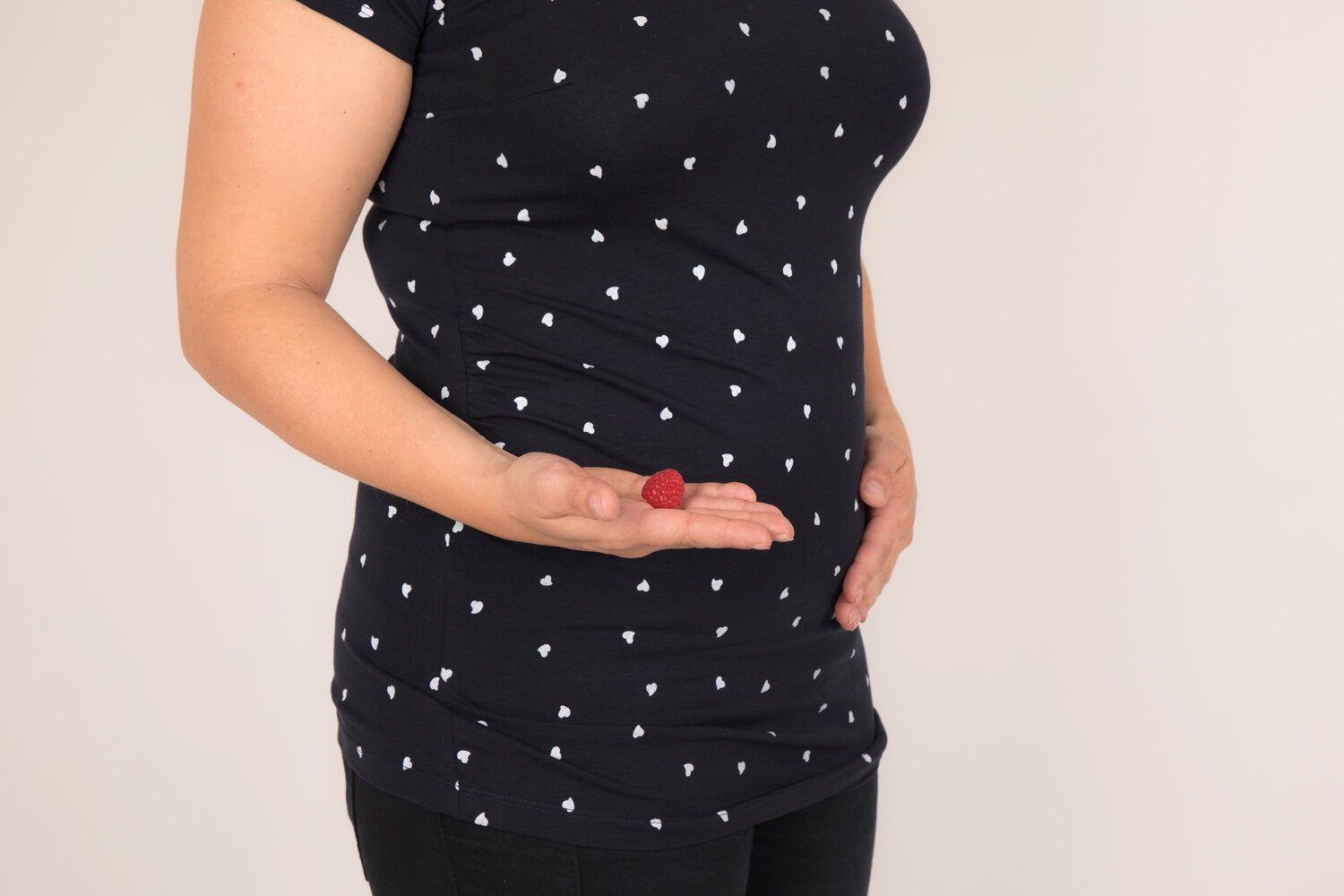
It is generally safe to eat raspberries during pregnancy. They are a good source of vitamin C, folate, and antioxidants, which can be beneficial for both you and your baby during pregnancy. However, it’s important to wash raspberries thoroughly before consuming them to remove any potential pesticides or contaminants. Also, to make sure you obtain a wide range of nutrients, be sure to incorporate a variety of fruits and vegetables into your diet.
Nutritional Value Of Raspberries
Raspberries are high in water content. One cup (106 grams) of raspberries contains 106 grams of water (1). It is rich in antioxidants. You can refer to the table below to find the major nutrients found in one cup of raspberries.
| Nutrients | Value |
| Energy | 271 KJ |
| Protein | 1.48 gm |
| Fiber | 8 gm |
| Sugar | 5.44 gm |
| Calcium | 30.8 mg |
| Magnesium | 27.1 mg |
| Phosphorus | 35.7 mg |
| potassium | 186 mg |
| Sodium | 1.23 mg |
| iron | 0.849 mg |
| zinc | 0.517 mg |
| copper | 0.111 mg |
| Manganese | 0.824 mg |
| Selenium | 0.248 µg |
| Vitamin K | 9.59 µg |
| Vitamin C | 32.2 mg |
| Vitamin A | 2.46 µg |
| Folate | 25.8 µg |
| Choline | 15.5 mg |
| Carotene, beta | 14.8 µg |
| Lutein + zeaxanthin | 167 µg |
10 Incredible Benefits of Raspberries During Pregnancy

Raspberries not only enhance your delicacies but also come with a lot of health benefits during pregnancy. These berries are packed with nutrients. Raspberries are a great addition to your diet if you are concerned that your unborn child isn’t receiving enough nutrients for optimal growth and development.
Some of the common health benefits of raspberry during pregnancy are listed below:
1. Helps Strengthen Uterine Muscles
There is not much scientific evidence to support the claim that raspberries specifically help strengthen uterine muscles. However, it is worth noting that certain nutrients found in raspberries, such as, play important roles in overall muscle function and health (2). Raspberry extract is often used as a relaxant and uterine stimulant (3). The fruit helps labor go more smoothly and safely by controlling uterine contractions. Thus, it is believed that red raspberries help ease labor pain.
2. Helps Ease Cramps
The leaves of red raspberries are known to be good for easing cramps, increasing uterine tone, nausea, fatigue, and pain during pregnancy, and easing labor pains (4). Drinking raspberry tea may also help prevent postpartum hemorrhage (4).
3. Prevents Iron Deficiency Anemia
As the mother’s blood volume increases and the fetus grows and develops, the need for iron during pregnancy rises sharply. Iron-deficiency anemia is quite common among pregnant women (5). Raspberries have a higher iron content than other fruits. Eating raspberries during pregnancy helps boost your hemoglobin count while protecting you from anemia fatigue and the dizziness associated with it.
4. Prevents Birth Defects in Babies
There is no single food that can guarantee the prevention of birth defects. Including raspberries in a well-balanced and nutritious diet during pregnancy can potentially reduce the likelihood of birth defects. Raspberry contains folic acid, which prevents neural tube birth defects (6).
5. Helps Improve Mother’s Health
Raspberries are rich in various vitamins and minerals, including vitamin C, vitamin K, manganese, and folate. These nutrients are important for the overall health of a pregnant woman. Being a good source of dietary fiber, eating raspberries may help keep constipation at bay. Fiber also helps to achieve healthy prenatal weight gain, reduce the risk of pre-eclampsia and glucose intolerance, and increase the quantity and diversity of the gut microbiota (7). Research has demonstrated that lutein can effectively lower the risk of cancer or impede the growth of cancer cells (8). Raspberries contain a good amount of lutein.
6. Improves Immunity
The nutrient table provided above clearly shows that raspberries are a highly abundant source of antioxidants, carotenoids like lutein and zeaxanthin, vitamins, and minerals. These nutrients contribute to improving immunity (9). Therefore, make sure to include raspberries in your list of “to eat” fruits to ward off diseases and infections and keep your fetus safe.
7. Helps Relieve Vaginal Infections
Most pregnant women experience vaginal infections, which may be itchy and sometimes painful. But raspberries are a wonderful home remedy to relieve infections, as they prevent the growth of certain bacteria and fungi in your body. Red raspberries contain flavonoids, which can further break down into compounds known as anthocyanins. These products possess antimicrobial properties (10). This could aid in combating vaginal infections.
Side Effects of Consuming Raspberries During Pregnancy
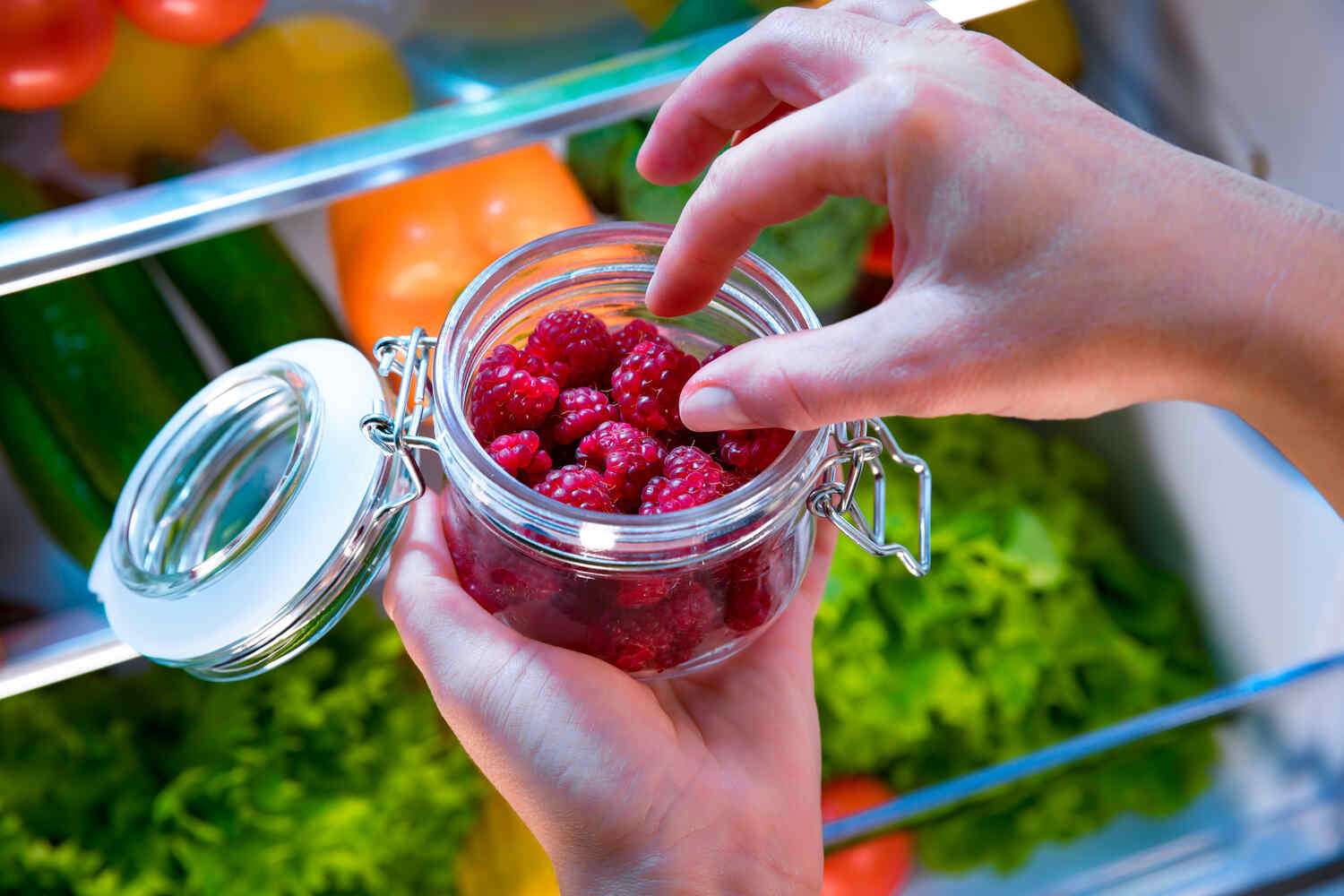
Raspberries are generally considered safe for consumption during pregnancy and can be a healthy addition to a well-balanced diet. However, pregnant women should consult with their doctor before making any significant changes to their diet or consuming specific foods, such as raspberries. Fresh raspberries are a nutritious food that offers essential vitamins and minerals. Still, it’s important to be aware of the following possible negative consequences of eating raspberries during pregnancy:
1. May Cause Allergy
Berries can cause allergies (11). Organically grown raspberries are preferable to conventionally grown ones due to the correlation between the anthocyanin concentration of conventional raspberries and allergy status (11).
2. Overconsumption Can Impair Digestion And Nutrient Absorption
Consuming an excessive number of fiber-rich fruits like raspberries may result in issues with digestion, such as bloating, gas, or diarrhea. It can also lead to abdominal cramps, as well as potentially impacting the absorption of essential minerals such as iron, zinc, or calcium from food (12). Since pregnancy hormones already increase the likelihood of digestive issues, when it comes to eating fiber-rich foods like raspberries, moderation is the key.
3. Overconsumption May Impact Blood Sugar Level
Raspberries contain natural sugars, and consuming them excessively can affect blood sugar levels. Pregnant women with gestational diabetes or other blood sugar issues should monitor their intake of raspberries.
4. Risk Of Pesticides Residue
If raspberries are not properly washed or if they are not organic, they may contain pesticide residues. Pregnant women should consider choosing organic raspberries or thoroughly washing conventionally grown ones to reduce exposure to pesticides. It can also be prone to contamination with bacteria such as Salmonella or E. coli.
5. May Trigger or Aggravate Heartburn
Some pregnant women may experience increased susceptibility to heartburn, and the acidic nature of raspberries could exacerbate this symptom in some individuals.
When Not to Eat Raspberries During Pregnancy?
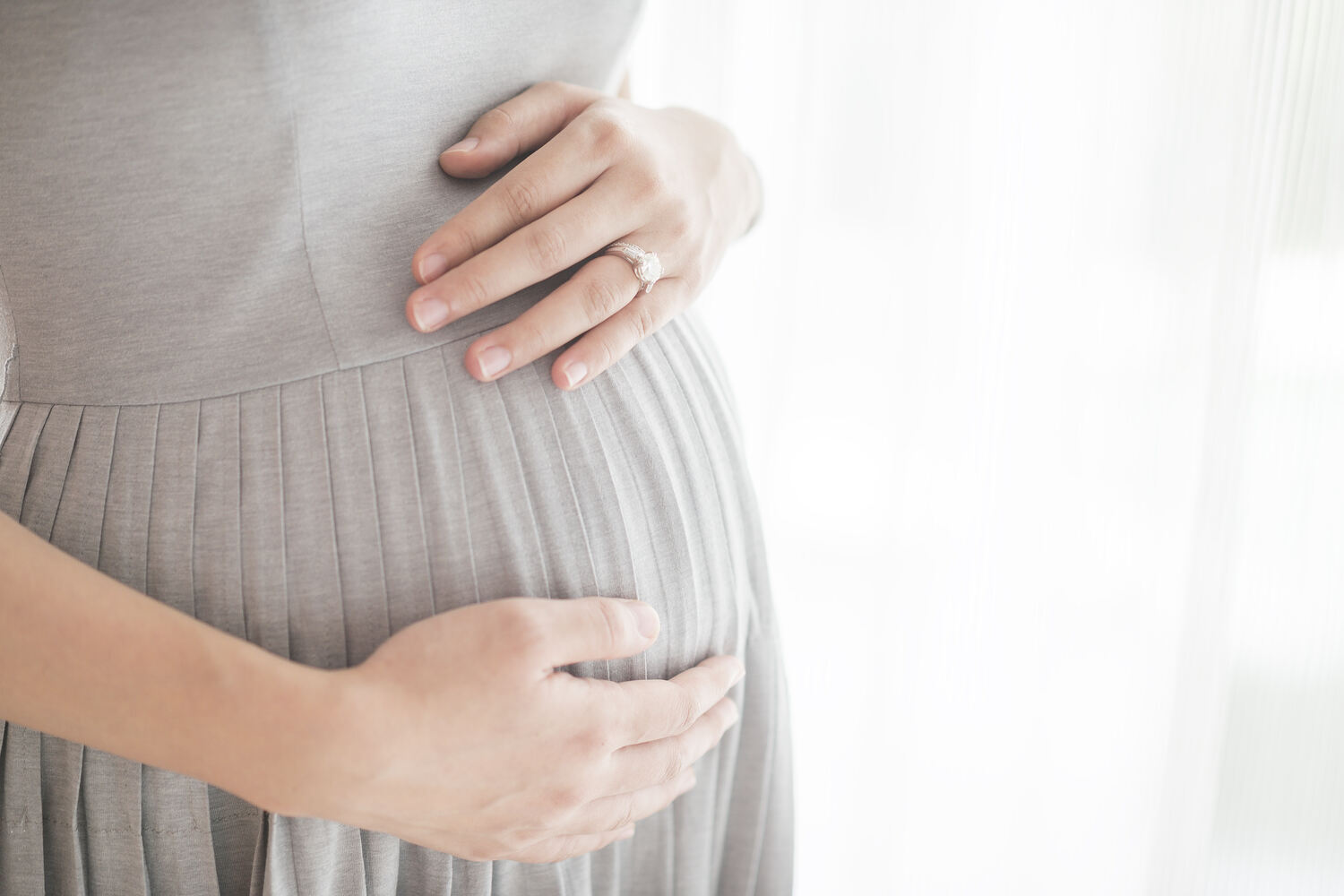
The abundance of beneficial nutrients, including vitamins, minerals, and antioxidants, in raspberries makes them a typically safe food choice for pregnant women. On the other hand, pregnant women should probably be careful or even avoid them in the following scenarios:
- During pregnancy, a woman with a berry allergy should avoid consuming raspberries and all other types of berries. Both pregnant women and their unborn babies are at risk from allergens, which can lead to moderate to severe reactions.
- Some pregnant women may be prone to gastrointestinal issues, such as indigestion or heartburn. In situations like these, it is advisable to avoid consuming acidic foods such as raspberries, as they may worsen the symptoms.
- People who have had breast, ovarian, or uterine cancer in the past or who are currently dealing with any of these types of cancer should not eat raspberries. The same goes for people who have had endometriosis or uterine tumors in the past (13).
How to Consume Raspberry During Pregnancy?
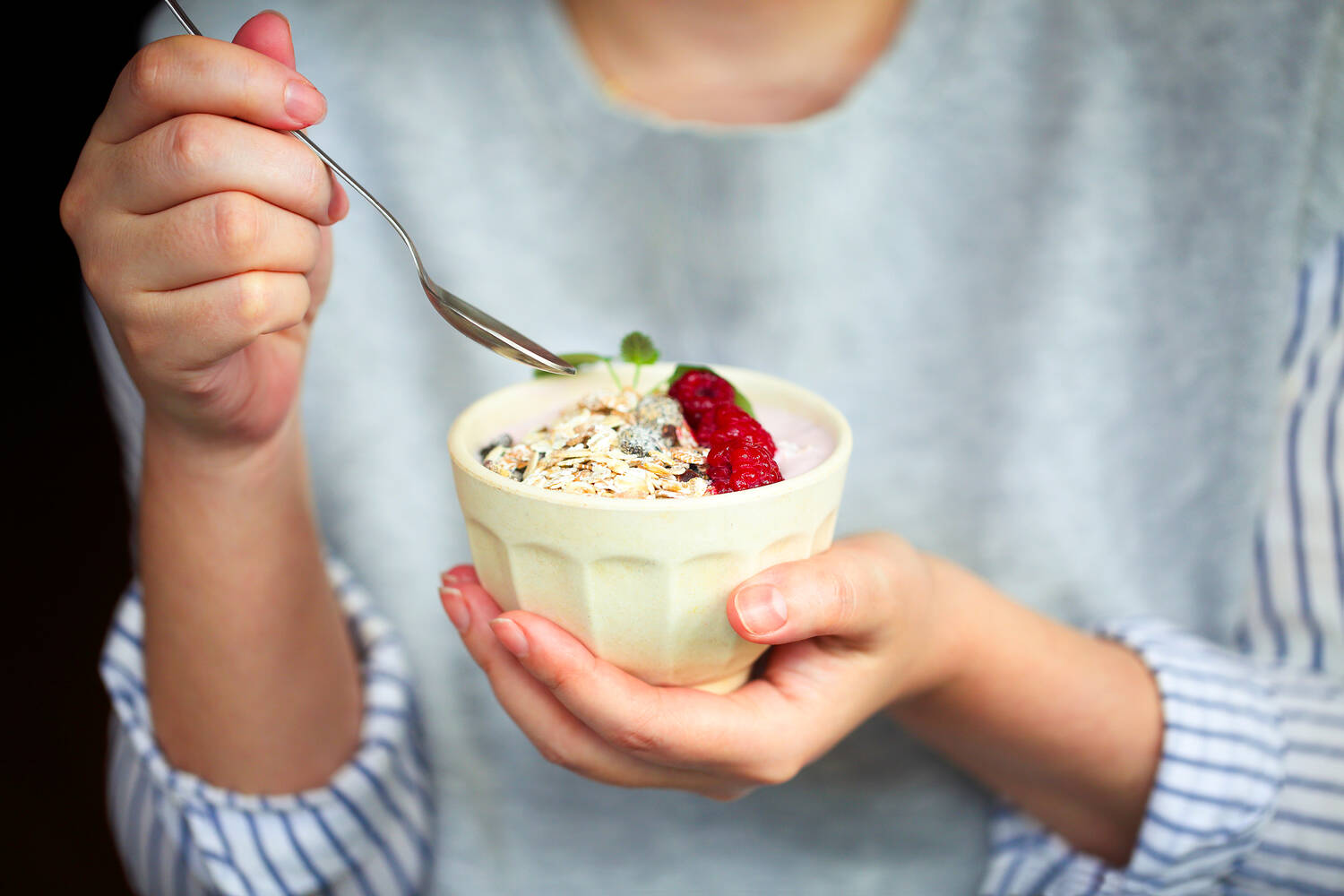
Before eating raspberries or using them in recipes, make sure to wash them thoroughly to remove any potential pesticides or contaminants. Here are some healthy ways to consume raspberries during pregnancy:
- Consider healthier dessert options to avoid excessive sugar intake.
- Eating fresh raspberries is a simple and delicious way to enjoy them. You can either eat them on their own or add them to yogurt, cereals, or salads.
- Smoothies made with raspberries, whether fresh or frozen, are a healthy and delicious treat. For extra nutrition, mix them with yogurt, milk, or a dairy-free milk option, as well as other fruits and veggies.
- You can bake with raspberries by adding them to cookies, pancakes, or whole-grain waffles. Adding them to your food in this way can be delectable.
- Raspberry leaf tea is often suggested for pregnant women, particularly in the later stages of pregnancy.
Is Raspberry Leaf Tea Safe During Pregnancy?

Red raspberry leaf tea is a herbal tea made from the raspberry plant’s leaves. Tea has always been used for therapeutic purposes. It is well known for its anti-inflammatory and antioxidant properties. Raspberry tea has been shown to improve uterine health by increasing blood flow and strengthening the uterine walls. This could help enhance the efficacy of labor contractions (4).
There is ongoing controversy surrounding the use of red raspberry leaf during the first trimester of pregnancy. This is primarily due to concerns about its potential to stimulate uterine tone and potentially lead to miscarriage. Generally, it is considered safe to use during the second and third trimesters (4).
So, if you decide to drink red raspberry leaf tea, it’s best to wait until you’re around 32 weeks pregnant and to do so in moderation. Start with one cup a day and gradually increase this to two or possibly three cups a day as the due date approaches. Pregnancy is a time when your taste buds long for different kinds of flavors—sometimes sweet and sometimes sour and tangy. With a little bit of caution and if consumed within permissible limits, almost all fruits and vegetables are deemed safe.
Don’t ignore your cravings-stay safe and enjoy your pregnancy!
FAQ’s
1. Are Raspberry Leaves Edible During Pregnancy?
These leaves are very healthy and have a lot of benefits for pregnant women. It can strengthen the muscles in the uterus, thus making labor pains more bearable. However, overconsumption and consumption during the first trimester should be avoided.
2. Can Eating Raspberries During Pregnancy Help the Unborn Child?
These fruits are rich in folic acid and are a rich source of iron. They are rich in antioxidants, too. So it may help the developing fetus.
3. How Can I Use Raspberry to Help With My Vaginal Infection During Pregnancy?
Vaginal infections can be due to yeast, which can survive in your gut. Regular consumption of raspberries can improve your gut health. Pregnant women can have fresh raspberries or even a refreshing raspberry tea.
4. Can I Have Raspberries if I am Planning for a Cesarean Delivery?
Raspberries can help strengthen your uterus. It can help it recover faster after surgery. However, there are contrasting views on this. Please consult your doctor for better guidance.
5. Is It Okay To Eat Frozen Raspberries While Pregnant?
Raspberry berries, just like any other preserved or frozen fresh fruit, are permissible to consume during pregnancy. Frozen raspberries are also a possibility since they are a seasonal product and may not be accessible year-round However, avoid packaged varieties that contain an excessive amount of sugar. Select freezer-safe containers devoid of ice and keep them far from raw meat and seafood.
Reference
- Raspberries, raw – [https://fdc.nal.usda.gov/fdc-app.html#/food-details/167755/nutrients]
- Minerals and Sarcopenia; The Role of Calcium, Iron, Magnesium, Phosphorus, Potassium, Selenium, Sodium, and Zinc on Muscle Mass, Muscle Strength, and Physical Performance in Older Adults: A Systematic Review – [https://pubmed.ncbi.nlm.nih.gov/28711425/]
- Raspberry Leaves and Extracts-Molecular Mechanism of Action and Its Effectiveness on Human Cervical Ripening and the Induction of Labor – [https://www.ncbi.nlm.nih.gov/pmc/articles/PMC10383074/]
- Red Raspberry Leaf – [https://www.sciencedirect.com/topics/medicine-and-dentistry/red-raspberry-leaf]
- The impact of maternal iron deficiency and iron deficiency anemia on child’s health – [https://www.ncbi.nlm.nih.gov/pmc/articles/PMC4375689/]
- Neural Tube Defects, Folic Acid and Methylation – [https://www.ncbi.nlm.nih.gov/pmc/articles/PMC3799525/]
- High-Fiber Diet during Pregnancy Characterized by More Fruit and Vegetable Consumption – [https://www.ncbi.nlm.nih.gov/pmc/articles/PMC7824257/]
- Lutein and Zeaxanthin and Their Roles in Age-Related Macular Degeneration—Neurodegenerative Disease – [https://www.ncbi.nlm.nih.gov/pmc/articles/PMC8874683/]
- Exploring the Immune-Boosting Functions of Vitamins and Minerals as Nutritional Food Bioactive Compounds: A Comprehensive Review – [https://www.ncbi.nlm.nih.gov/pmc/articles/PMC8779769/]
- Antioxidant activity and antimicrobial effect of berry phenolics–a Finnish perspective – [https://pubmed.ncbi.nlm.nih.gov/17492800/]
- The Interaction between Antioxidants Content and Allergenic Potency of Different Raspberry Cultivars – [https://www.ncbi.nlm.nih.gov/pmc/articles/PMC7139461/]
- Therapeutic Benefits and Dietary Restrictions of Fiber Intake: A State of the Art Review – [https://www.ncbi.nlm.nih.gov/pmc/articles/PMC9268622/]
- raspberry – [https://wa.kaiserpermanente.org/kbase]

Editorial Team,
With a rich experience in pregnancy and parenting, our team of experts create insightful, well-curated, and easy-to-read content for our to-be-parents and parents at all stages of parenting.Read more.
Responses (0)
Want curated content sharply tailored for your exact stage of parenting?
Related articles

Uterine Tachysystole During Pregnancy – Causes, Risks and Treatment
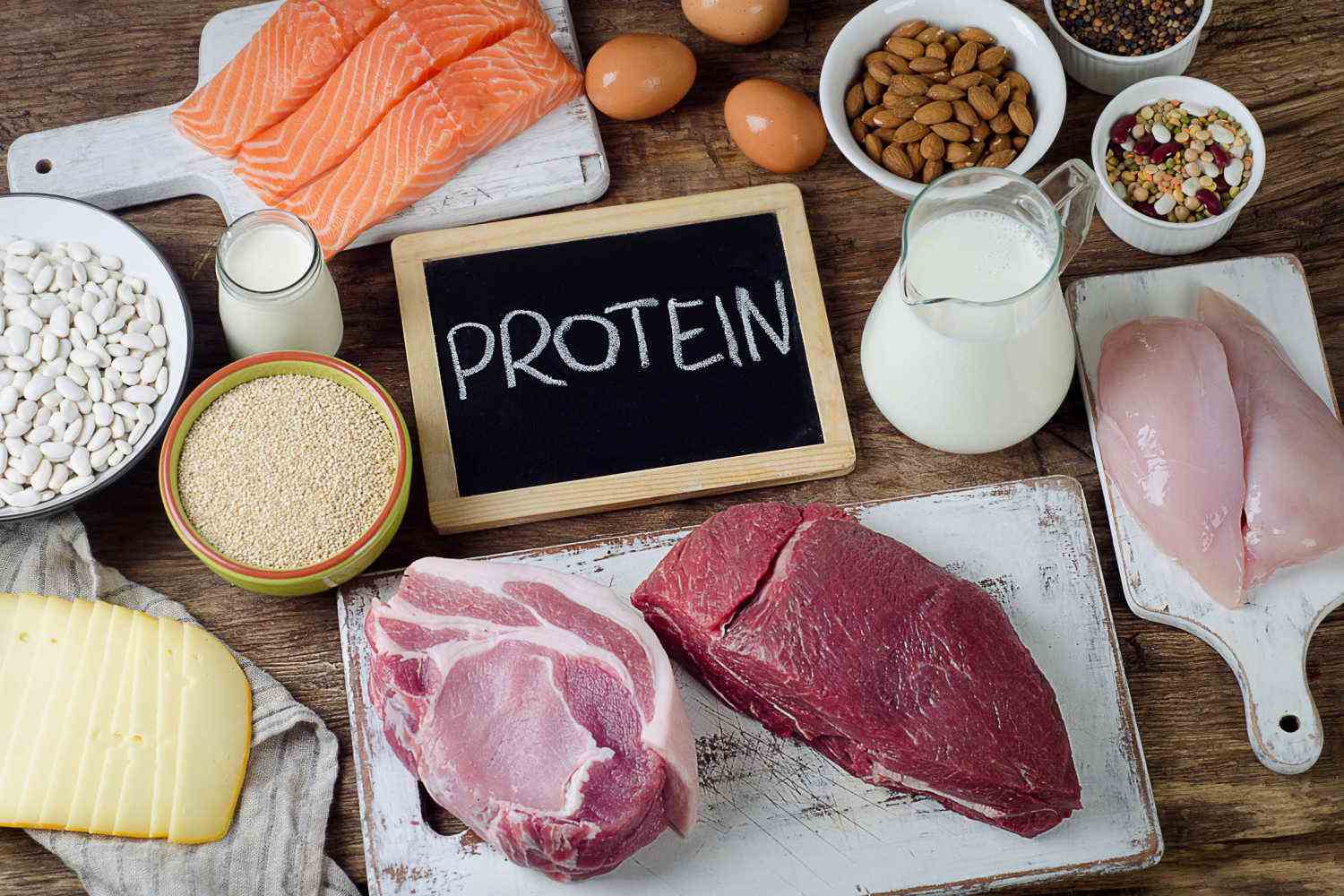
Protein During Pregnancy – Importance and Sources

Sheehan’s Syndrome – Excessive Bleeding During Childbirth

Top 500 Latest Baby Boy Names Starting With Y

Intrahepatic Cholestasis of Pregnancy – Symptoms And Causes

Mobile Phones During Pregnancy – Are They Safe?
Sponsored content
Discover great local businesses around you for your kids.
Get regular updates, great recommendations and other right stuff at the right time.





